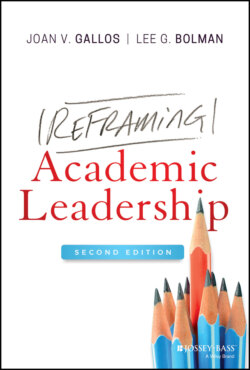Читать книгу Reframing Academic Leadership - Lee G. Bolman - Страница 38
Work on Balancing Advocacy and Inquiry
ОглавлениеSome leaders advocate far more than they inquire. Others do the opposite. Paying attention to your patterns can help you assess the appropriate balance for your purposes. Effective academic leaders are versatile and skilled in both areas. But effectiveness is reflected not only in the amount of each but in the quality. Quantity is easier to assess – and focusing on balance is a good entry point for academic leaders new to these issues. Improving the quality of advocacy and of inquiry is a harder task. Good advocacy is complex. It is the ability to communicate clearly and persuasively. That means talking about your take on reality and the reasoning behind your diagnoses and decisions without discouraging others from doing the same. Inquiry involves skills in listening, reflecting what you hear to test accuracy, and crafting questions that enable you to learn the things you need to know. You won't get that from asking leading questions that manipulate the answer. Yes/no questions will get you a brief response but may reveal little about what others think, feel, or know. Good inquiry uses questions of how, what, and why to get people talking about things that matter.
Yo‐Yo Ma, the world's most beloved cellist, is best known for his virtuoso concert performances and his many collaborations with artists across the globe. A less well‐known secret is his gentle persistence in trying to learn from others. In the 1990s, for example, he collaborated with famed choreographer Mark Morris to marry dance with a Bach cello suite. Morris initially worried that Ma might turn out to be an arrogant diva. But during their work together, Ma continually and disarmingly asked for input and feedback from Morris. At one point he asked, “What are the chances, do you think, that if I hang around, I could learn what the choreography is, so that I could actually be influenced by the action on stage?” Or consider the following dialogue between the two:
MA:
Do you have any doubts about our doing this together?
MORRIS:
Well, absolutely, in the notion that we're laying new opinions onto what already exists. The liberating part is that we don't actually have to agree on everything. We don't have to agree on an exact point of view with this music. But if we're relatively honest, something may happen that's not a horrible crime.
MA:
That's the best thing that you hope for?
MORRIS:
That's the worst thing I would hope for.
MA:
(laughs) So what's the best thing that you would hope for?
MORRIS:
The best is an absolutely transcendent, transparent, you know, transmogrifying kind of situation where it gets bigger than all of that (Rhombus Media, 1997).
Yo‐Yo Ma's determination to keep learning and improving his craft is a model for us all.
